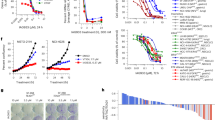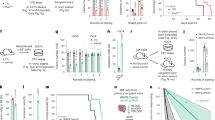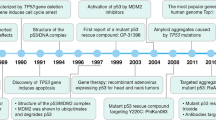Abstract
Hepatocyte growth factor (HGF) is involved in malignant behavior of cancers as a mediator of tumor-stromal interactions, facilitating tumor invasion and metastasis. We have investigated whether a blockade of HGF using recombinant NK4, an HGF antagonist, would lead to growth inhibition of the human gastric carcinoma cell line, TMK1. To evaluate the function of endogenous NK4 and investigate its potential inhibitory effect, TMK1 cells were transfected with NK4 plasmid. After selection, NK4-expressing cells (T11) were obtained, and cell growth was evaluated. Significant growth inhibition was observed in the T11-group compared to the control both in vitro and in vivo. Moreover, we investigated the effect of exogenous NK4 transferred by an adenovirus vector (AdCMV.NK4). Cell proliferation of AdCMV.NK4 infected TMK1 cells was significantly inhibited compared with the control group. We also assessed the in vivo tumor suppression effect of AdCMV.NK4. The tumor volume following treatment with AdCMV.NK4 was significantly inhibited compared to that of the control group. These findings indicate that NK4 gene expression has a potential role in controlling proliferation of cancer cells. In conclusion, NK4 is a promising therapeutic agent and its gene delivery may be a new approach to treating patients with advanced gastric cancer.
This is a preview of subscription content, access via your institution
Access options
Subscribe to this journal
Receive 12 print issues and online access
$259.00 per year
only $21.58 per issue
Buy this article
- Purchase on Springer Link
- Instant access to full article PDF
Prices may be subject to local taxes which are calculated during checkout





Similar content being viewed by others
References
Patino JF . The current management of gastric cancer Adv Surg 1994 27: 1–19
Wanebo HJ, Kennedy BJ, Osteen R et al. Cancer of the stomach. A patient care study by the American College of Surgeons Ann Surg 1993 218: 583–592
Nakamura T, Nawa K, Ichihara A . Partial purification and characterization of hepatocyte growth factor from serum of hepatectomized rats Biochem Biophys Res Commun 1984 122: 1450–1459
Nakamura T, Nishizawa T, Shimizu S et al. Molecular cloning and expression of human hepatocyte growth factor Nature 1989 342: 440–443
Vande Woude GF, Jeffers M, Resau J et al. Met-HGF/SF: tumorigenesis, invasion and metastasis Ciba Found Symp 1997 212: 119–130 discussion 130–132, 148–154
Nakamura T, Matsumoto K, Nakamura T et al. Induction of hepatocyte growth factor in fibroblasts by tumor-derived factors affects invasive growth of tumor cells: in vitro analysis of tumor-stromal interactions Cancer Res 1997 57: 3305–3313
Jiang W, Hiscox S, Nakamura T et al. Hepatocyte growth factor/scatter factor, its molecular, cellular and clinical implications in cancer Crit Rev Oncol Hematol 1999 29: 209–248
Shibamoto S, Hayakawa M, Ito F et al. Hepatocyte growth factor and transforming growth factor-beta stimulate both cell growth and migration of human gastric adenocarcinoma cells Cell Struct Funct 1992 17: 185–190
Han SU, Lee JH, Kim MW et al. Significant correlation between serum level of hepatocyte growth factor and progression of gastric carcinoma World J Surg 1999 23: 1176–1180
Niki M, Isozaki H, Tanigawa N et al. Serum human hepatocyte growth factor (hHGF) is elevated in patients with metastatic gastric carcinoma Hepatogastroenterology 1998 45: 2458–2463
Kaji M, Yonemura Y, Yamamoto H et al. Participation of c-met in the progression of human gastric cancers: anti-c-met oligonucleotides inhibit proliferation or invasiveness of gastric cancer cells Cancer Gene Ther 1996 3: 393–404
Nakajima M, Sawada H, Nakano H et al. The prognostic significance of amplification and overexpression of c-met andc-erb B-2 in human gastric carcinomas Cancer 1999 85: 1894–1902
Date K, Matsumoto K, Nakamura T et al. HGF/NK4 is a specific antagonist for pleiotrophic actions of hepatocyte growth factor FEBS Lett 1997 420: 1–6
Date K, Matsumoto K, Nakamura T et al. Inhibition of tumor growth and invasion by a four-kringle antagonist (HGF/NK4) for hepatocyte growth factor Oncogene 1998 17: 3045–3054
Parr C, Hiscox S, Jiang WG et al. NK4, a new HGF/SF variant, is an antagonist to the influence of HGF/SF on the motility and invasion of colon cancer cells Int J Cancer 2000 85: 563–570
Hiscox S, Parr C, Jiang WG et al. Inhibition of HGF/SF-induced breast cancer cell motility and invasion by the HGF/SF variant, NK4 Breast Cancer Res Treat 2000 59: 245–254
Maehara N, Matsumoto K, Nakamura T et al. NK4, a four-kringle antagonist of HGF, inhibits spreading and invasion of human pancreatic cancer cells Br J Cancer 2001 84: 864–873
Parr C, Davies G, Jiang WG et al. The HGF/SF-induced phosphorylation of paxillin, matrix adhesion, and invasion of prostate cancer cells were suppressed by NK4, an HGF/SF variant Biochem Biophys Res Commun 2001 285: 1330–1337
Tomioka D, Maehara N, Nakamura T et al. Inhibition of growth, invasion, and metastasis of human pancreatic carcinoma cells by NK4 in an orthotopic mouse model Cancer Res 2001 61: 7518–7524
Saga Y, Mizukami H, Ozawa K et al. Expression of HGF/NK4 in ovarian cancer cells suppresses intraperitoneal dissemination and extends host survival Gene Ther 2001 8: 1450–1455
Maemondo M, Narumi K, Nukiwa T et al. Targeting angiogenesis and HGF function using an adenoviral vector expressing the HGF antagonist NK4 for cancer therapy Mol Ther 2002 5: 177–185
Hirao T, Sawada H, Nakano H et al. Antisense epidermal growth factor receptor delivered by adenoviral vector blocks tumor growth in human gastric cancer Cancer Gene Ther 1999 6: 423–427
Seki T, Ihara I, Shimizu S et al. Isolation and expression of cDNA for different forms of hepatocyte growth factor from human leukocyte Biochem Biophys Res Commun 1990 172: 321–327
Kuba K, Matsumoto K, Nakamura T et al. HGF/NK4, a four-kringle antagonist of hepatocyte growth factor, is an angiogenesis inhibitor that suppresses tumor growth and metastasis in mice Cancer Res 2000 60: 6737–6743
Sawada H, Wakabayashi H, Nicolson GL et al. Differential motility stimulation but not growth stimulation or adhesion of metastatic human colorectal carcinoma cells by target organ-derived liver sinusoidal endothelial cells Clin Exp Metastasis 1996 14: 308–313
Korst RJ, Bewig B, Crystal RG . In vitro and in vivo transfer and expression of human surfactant SP-A-and SP-B-associated protein cDNAs mediated by replication-deficient, recombinant adenoviral vectors Hum Gene Ther 1995 6: 277–287
Kanegae Y, Lee G, Saito I et al. Efficient gene activation in mammalian cells by using recombinant adenovirus expressing site-specific Cre recombinase Nucleic Acids Res 1995 23: 3816–3821
Kanai F, Shiratori Y, Omata M et al. Gene therapy for alpha-fetoprotein-producing human hepatoma cells by adenovirus-mediated transfer of the herpes simplex virus thymidine kinase gene Hepatology 1996 23: 1359–1368
Kuniyasu H, Yasui W, Tahara E et al. Aberrant expression of c-met mRNA in human gastric carcinomas Int J Cancer 1993 55: 72–75
Jiang WG, Hiscox SE, Mansel RE et al. Antagonistic effect of NK4, a novel hepatocyte growth factor variant, on in vitro angiogenesis of human vascular endothelial cells Clin Cancer Res 1999 5: 3695–3703
Matsuda KM, Madoiwa S, Matsuda M et al. A novel strategy for the tumor angiogenesis-targeted gene therapy: generation of angiostatin from endogenous plasminogen by protease gene transfer Cancer Gene Ther 2000 7: 589–596
Blezinger P, Wang J, Min W et al. Systemic inhibition of tumor growth and tumor metastases by intramuscular administration of the endostatin gene Nat Biotechnol 1999 17: 343–348
O'Reilly MS, Holmgren L, Folkman J et al. Angiostatin induces and sustains dormancy of human primary tumors in mice Nat Med 1996 2: 689–692
Lan KH, Kanai F, Omata M et al. In vivo selective gene expression and therapy mediated by adenoviral vectors for human carcinoembryonic antigen-producing gastric carcinoma Cancer Res 1997 57: 4279–4284
Acknowledgements
We express special gratitude to Dr Hidetomo Sawada for technical advice and helpful suggestions.
Author information
Authors and Affiliations
Corresponding author
Rights and permissions
About this article
Cite this article
Hirao, S., Yamada, Y., Koyama, F. et al. Tumor suppression effect using NK4, a molecule acting as an antagonist of HGF, on human gastric carcinomas. Cancer Gene Ther 9, 700–707 (2002). https://doi.org/10.1038/sj.cgt.7700482
Received:
Published:
Issue Date:
DOI: https://doi.org/10.1038/sj.cgt.7700482
Keywords
This article is cited by
-
Gastric cancer and mesenchymal stem cell-derived exosomes: from pro-tumorigenic effects to anti-cancer vehicles
Archives of Pharmacal Research (2024)
-
Anti-metastatic effects of viral and non-viral mediated Nk4 delivery to tumours
Genetic Vaccines and Therapy (2009)
-
Augmented anti-tumor therapy through natural targetability of macrophages genetically engineered by NK4 plasmid DNA
Gene Therapy (2008)
-
RETRACTED ARTICLE: Enhanced suppression of tumor growth using a combination of NK4 plasmid DNA-PEG engrafted cationized dextran complex and ultrasound irradiation
Cancer Gene Therapy (2006)
-
Gene Therapy Strategies for Hepatocellular Carcinoma
Journal of Biomedical Science (2006)



